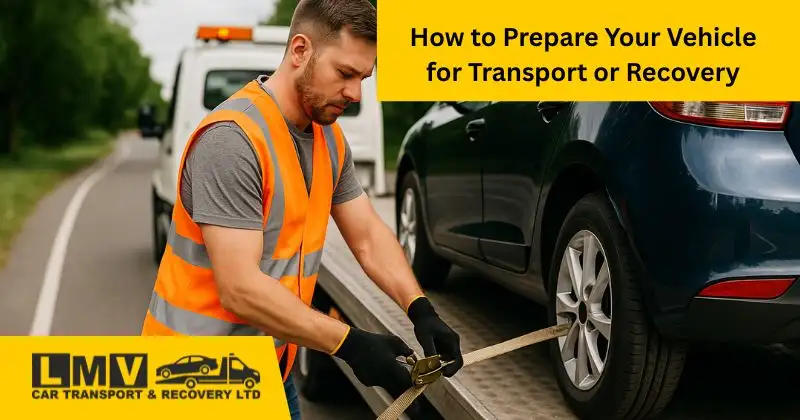
Getting your vehicle ready for transport or recovery isn’t just about booking a service—it’s about preparation. Whether you're using a car transport London service or need emergency assistance, knowing how to prepare your car can help ensure a smooth and safe journey.
Table of Contents
Preparing your vehicle isn’t just about courtesy—it’s essential for safety, efficiency, and avoiding delays. Recovery drivers and transport professionals depend on your preparation for proper loading and transit.
Whether you’re booking vehicle recovery London or scheduled car transport, a well-prepared car helps:
Before your vehicle is picked up or towed, ensure you have relevant paperwork ready:
For some types of non runner car transport London, you may also need customs or vehicle inspection documents.
It may seem unnecessary, but cleaning your car helps you inspect its condition and ensures accurate documentation. Clean windows and interiors make the vehicle safer and quicker to move. A clean vehicle also prevents items from being left behind or mistaken for debris.
Your transport or recovery provider is not responsible for lost personal items. Remove:
This is especially important when using a car recovery London service, where sudden movements could shift loose items.
Make sure your vehicle isn't leaking oil, coolant, or fuel. Excess fluid may cause transport issues or pose hazards to the transporter. For vehicles still drivable, top up necessary fluids like coolant or brake fluid before handover.
If you notice any leaks before collection, inform the vehicle recovery team in advance so they can bring appropriate equipment (drip trays or containment tools).
Most recovery and transport vehicles involve tilting, winching, or jostling. An active alarm may be triggered unnecessarily, leading to delays. Deactivate alarms or notify the driver of any auto-security systems.
Failing to disable alarms may cause battery drainage or delays, especially during car transport that spans several hours or overnight journeys.
Ensure all four tyres are properly inflated to facilitate loading. A flat tyre makes winching dangerous or impossible. If your battery is dead, inform the recovery company ahead of time so they bring the necessary equipment.
Low tyre pressure or a dead battery may incur extra charges during nationwide car transport bookings, as recovery teams often operate under tight schedules.
Before handover, inspect your vehicle thoroughly. Document dents, scratches, or rust spots with time-stamped photos. This protects you in case of disputes and helps the recovery driver mark damages clearly before transport.
Provide the driver with a checklist or walkaround summary if possible. This is especially helpful when transporting valuable or vintage vehicles.
If your car is not drivable or was involved in an accident, preparation is even more important. Here’s what to do:
Whether it’s a driveway or roadside, make it easier for the vehicle transport crew to hook the car safely without added risk.
On the day of transport or recovery:
Ask for confirmation once the vehicle is safely loaded. Some companies also offer photo confirmation or delivery tracking—especially useful for long-distance jobs.
Being transparent and ready ensures a smooth recovery or transport experience. A well-prepared car not only protects your asset but also respects the professionals handling your vehicle.
Proper vehicle preparation is a vital part of any successful transport or recovery service. Whether your car is in perfect condition or has mechanical issues, following the above steps ensures a safe, fast, and stress-free process. For reliable recovery or transport, trust LMV Recovery’s expert services across London and the UK.
Need help? Get your instant online quote or contact our team today.